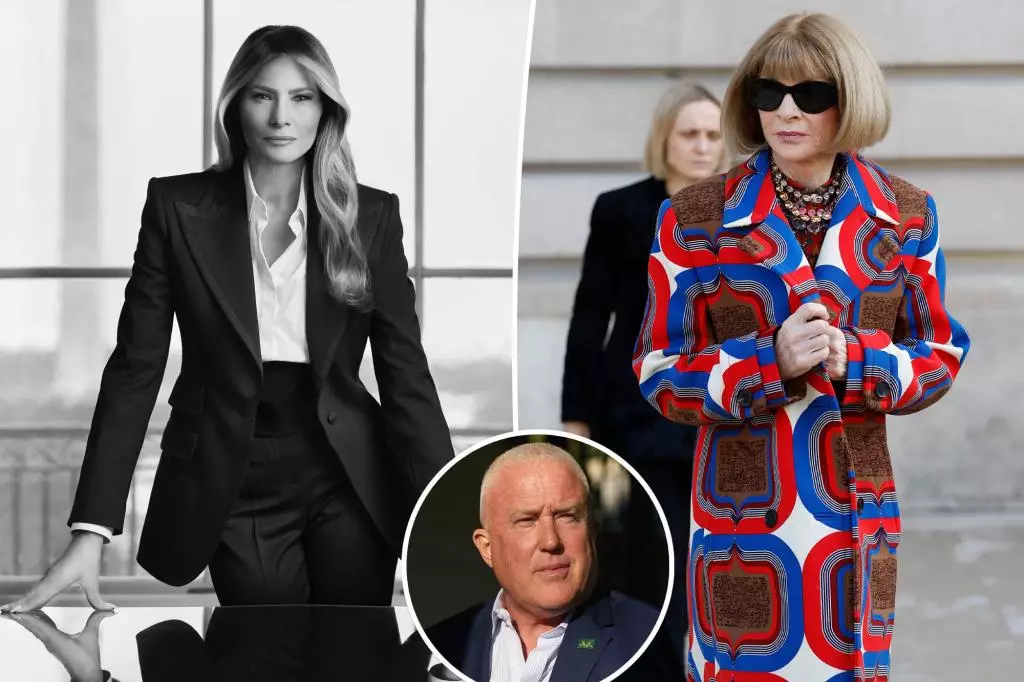The intersection of fashion and politics has always stirred compelling narratives, and the latest feud involving Melania Trump and Vogue editor Anna Wintour has heightened tensions within these realms. With emotions running high, friends and supporters of Melania have rallied to her defense against what they view as a personal affront delivered by a major fashion publication. This situation showcases the often-contentious relationship between cultural icons and political figures, and the implications this has for public perception.
In a recent Vogue article, the magazine didn’t hold back in its critique of Melania Trump’s portrayal as First Lady. Commenting on her official White House photograph, Vogue suggested that she appeared more suited for a reality TV show than the dignified role she held. The rift was exacerbated by the magazine’s snide remarks, comparing her presence to that of a “freelance magician” rather than a public servant, leaving many of Trump’s close associates incensed. Bill White, appointed by Donald Trump as a potential ambassador, epitomized this backlash by proclaiming his admiration for Melania and urging people to boycott the publication, sarcastically dubbing it “Condé Nasty.”
This encapsulates a stark issue at the heart of the debate: the scrutiny levied upon public figures, particularly women, and how such critiques can lead to calls for action from their supporters. There exists a sense of collective loyalty among Melania Trump’s allies, who are quick to rebuke any perceived slight against her. This tribalism reveals a polarized climate where public discourse becomes militarized, pitting one side against another in a cultural battle fueled by personalities rather than policies.
In the wake of the Vogue article, supporters have steadfastly defended Melania Trump’s character and achievements. Bill White emphasized her elegance, fluency in several languages, and prowess as a businesswoman, arguing that she embodies the essence of beauty and grace that his party upholds. They positioned her as not only a commendable First Lady but as a multifaceted individual whose contributions extend beyond aesthetic representation.
Such assertions are not uncommon in political circles where supporters often position their figurehead as the embodiment of idealism. Melania’s defenders are encapsulating a narrative that frames her as a model of motherhood and partnership to the President, attempting to counter the critical public opinion shaped by the media. This insistence on portraying her in a positive light underscores the power dynamics at play and demonstrates how fashion is more than mere clothing – it symbolizes broader sociopolitical identities.
Melania Trump has been vocal about her disinterest in securing magazine covers, reflecting a broader sentiment held by many public figures regarding media engagement. In expressing her views, she acknowledges the relentless scrutiny faced by First Ladies and encourages a focus on substantive matters rather than superficial appearances. This tendency to dismiss the importance of coverage can be seen as a response to media culture that often reduces individuals to caricatures rather than recognizing their full humanity.
There’s a duality in Melania’s stance; while proponents celebrate her decision to eschew media glitz, her critics cite it as evidence of disconnection from the societal roles expected of political spouses. Even within her loyalist circles, there is fractiousness about her position in the fashion world, with mixed sentiments about the treatment she receives from designers and magazine editors.
Meanwhile, this conflict is a microcosm of a larger cultural war that involves not only Melania Trump but also her predecessors and successors. The fact that Jill Biden graced Vogue’s cover while Melania did not highlights the ideological chasm that permeates the fashion industry and its affiliations with political discourse. Wintour’s silence amid this controversy only intensifies the drama, leaving open questions about media ethics, representation, and the responsibilities of public platforms.
As the narrative unfolds, the implications for both Melania Trump and Vogue extend beyond this singular incident. Each moment of controversy weaves into an ongoing dialogue about the role of fashion in shaping political identity and the complexities that arise when these worlds collide. The outcome remains uncertain, yet one thing is clear: in today’s charged political climate, perceptions, representations, and defenses will continue to collide on the battleground of public opinion.

